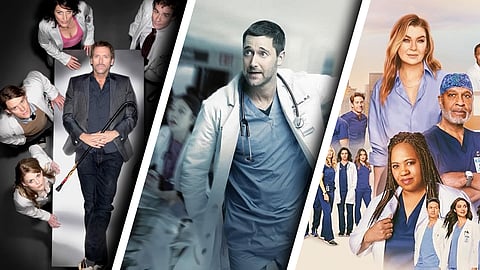

I’ve watched what one would call an above average number of medical dramas, especially during my high school and secondary school days. My passive interest in them began when I was introduced to Code Black, a series that aired from 2015–2018. I was just in my pre-teens when I started watching it, and what began as casual viewing soon turned into something more meaningful.
To be honest, it wasn’t the ‘drama’ part of the show that held my attention the most, it was the medical procedures in the ER (emergency room, the American equivalent of our Casualty), the anticipation of a crisis, and how the doctors and nurses respond under immense pressure. In most stories, a crisis is introduced so that we can see how a character overcomes it, and based on that, we get a sense of who they are. The tension and unpredictability kept me hooked, often late into the night, even before exams.
When a show manages to balance both the adrenaline of solving a medical case and the emotional weight of the drama, that is when it becomes great. Several studies have explored the impact of this genre of entertainment. Some pointed out that medical dramas can be valuable as training material for healthcare students. Others, however, focused on evaluating the accuracy and reliability of how medical practices are depicted.
Critics frequently argue that medical dramas distort reality by showcasing incorrect procedures, exaggerating interventions, or portraying entirely unrealistic scenarios, sometimes even spreading misinformation about healthcare. A well-cited example is the extremely popular show Grey’s Anatomy (renewed for Season 22), which shaped public perceptions of trauma care. Viewers were led to believe that rapid recovery was possible after hospitalisation in the case of severe accidents or injuries.
Of course, as a teenager, I didn’t notice this aspect while watching, I was only captivated by the storylines. Looking back, this explains why accuracy mattered less to viewers than the emotional pull of the narrative.
The show that truly shifted my perspective, however, was New Amsterdam (2018–2023). Unlike many medical dramas built around individual cases or hospital politics, this one (based on the real-life Bellevue Hospital in New York City, the oldest hospital in the United States) focused on the flaws in the American healthcare system. The narrative about a medical director attempting to fix a neglected public hospital embodied ideals of government intervention to correct market failures and provide for the common good through improved public health services. (I was already a fan of Ryan Eggold, who played Dr Max Goodwin, from his role as Tom Keen in The Blacklist.)
The series struck a chord with me, reflecting elements of welfare politics familiar in a Left-leaning Kerala context, but transplanted to an American hospital setting. By showing systemic problems within public hospitals, advocating for universal access to care, and highlighting social determinants of health that disproportionately affect underserved communities, New Amsterdam felt like more than just entertainment.
The show often shone a spotlight on the social side of healthcare. Each episode highlighted problems faced by ordinary people when they entered the hospital system, such as mental health struggles, addiction, children with psychiatric issues, or the simply the difficulty of affording treatment. The ‘solutions’ in the show were often idealistic, sometimes even unrealistic, but the underlying message was clear – healthcare can do better and it must do better. Watching the show became a near-daily conversation starter with my family about how different systems work, where they fail, and what makes one system better than another.
This was when I developed a lingering respect and deep appreciation for Kerala’s healthcare model. Here, the system operates on a three-tier structure – primary or family health centres at the base, taluk or district hospitals in the middle, and medical colleges at the top. Combined with consistent government intervention, this structure ensures care that is both accessible and affordable. In sharp contrast, the United States remains almost entirely privatised, with no universal healthcare and no structured system that guarantees access at every level. This lack results in delays even for basic treatments. Ultimately, it is a system that prioritises profit over people.
And this realisation came to me not through a policy textbook, but through a TV drama. New Amsterdam showed us what a people-focused healthcare model might look like in America and reminded me of the strengths of the system we already have in Kerala.
House MD (2004–2012) was another medical drama that felt like Sherlock Holmes mysteries set in a hospital. In fact, the parallels between the two are uncanny, almost like the creators of House MD wanted us to draw them. The main character in House MD and Holmes both mirror each other in personality – maverick, abrasive, socially difficult, yet unrivalled in their professions. Hugh Laurie’s portrayal of House as a ‘high-functioning sociopath’ made the character strangely likable, and every episode felt like both an investigation and a thriller.
Eventually, I made my way to Grey’s Anatomy, often considered the classic of the genre. To me, it felt like a ‘jack of all trades, master of none’. It had a little bit of everything, but it wasn’t the best at any one thing. Though I understand why it has attracted millions of viewers worldwide, especially those who want equal measures of soap opera and surgery, I lost interest by the third season.
Looking back, I realise that these medical dramas shaped my teenage years as they entertained me, educated me, and gave me a deeper respect for my home state’s healthcare system.
Anpu Saramsh is an Engineering student and a gamer.